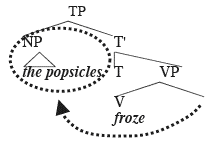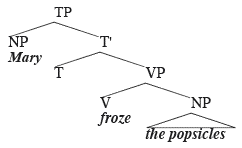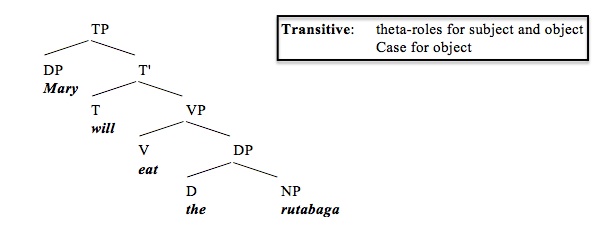
(1) a. John ate. b. John ate a rutabaga. (2) a. The popsicles froze. b. Mary froze the popsicles.
Up until now, when we've been talking about selection, we've been concentrating mainly on verbs that are obligatorily transitive (like devour), and verbs that are obligatorily intransitive (like rejoice). But we can see in (1-2) that many verbs have what are sometimes called transitivity alternations; they can be either transitive or intransitive.
The transitivity alternations in (1) and (2) are of different types. In order to discuss this clearly, it's going to be useful to introduce some terminology--really just names for things we've been tacitly assuming for a while now, without really talking about them. In both of the transitive (b) examples above, the sentences describe an action involving a person who does something (what we could call an Agent) and a thing which undergoes a change (a Patient). In (1a), the Patient is missing, while in (2a) it is the Agent that is missing. Names like "Agent" and "Patient" are instances of what are called theta-roles, which is an abbreviation of thematic roles. Theta-roles describe the various ways in which individuals can be involved in an event or state being described in a sentence. A standard way to talk about selection is in terms of theta-roles; we say that a verb like ate in (1b) assigns Agent and Patient theta-roles, which is a way of saying that it selects for both a subject and an object. Assignment of theta-roles is constrained by the theta-criterion:
Theta-criterion
The theta-criterion guarantees that an example like (3) will be ill-formed;
(3) *The dragon devoured.The first part of the theta-criterion says that, since devour assigns a Patient theta-role, this theta-role must be assigned. The second part says that the Patient theta-role cannot be assigned to the dragon, which already has the Agent theta-role (that is, the sentence cannot mean 'The dragon devoured itself').
Now that we're familiar with the notion of theta-roles, we can return to the transitivity alternations in (1-2). The one in (1) is comparatively easy to handle; apparently the verb eat always assigns a theta-role to its subject (an Agent theta-role), and optionally assigns one to an object as well (a Patient theta-role).
In (2), we have a different kind of problem. The verb freeze appears to obligatorily take a Patient, and optionally take an Agent. In (2a), the Patient is the subject, while in (2b), the Patient is the object. So now we have a question: why is the popsicles the subject of (2a) but the object of (2b)?
We can answer part of this question right away. Since Mary is the subject in (2b), there's no way for the popsicles to also be the subject; we wouldn't have any way to draw a tree in which both of these NPs are in the specifier of TP. So the real question is: why is the popsicles the subject of (2a)? This is sort of similar to the question we faced when we were looking at passives: do we want to allow freeze to assign its Patient theta-role in two different structural configurations? Or should we posit a movement operation in (2a), which takes the popsicles out of its rightful place in object position, and moves it to the specifier of TP?
We have lots of good reasons to think that, as with passives, verbs like the one in (2a) are best analyzed by positing movement. In other words, we think that the trees for (2a-b) are the ones in (4) and (5):
(4)

(5)

In this approach, freeze always assigns its Patient theta-role to its complement; it's just that the movement in (4) makes it harder to see this. We call verbs like intransitive freeze, in which the subject begins in object position, unaccusatives. Intransitive verbs which are not unaccusative (like eat in (1b)) are unergative. You may also, especially in older work, see people calling unaccusative verbs "ergative verbs", but we won't do that in this class.
Some of the arguments for this approach to unaccusatives are the same arguments we heard earlier for A-movement in passives. For example, there's an argument from resultatives. We saw before that in clauses with transitive verbs, resultatives can only modify the object, not the subject:
(6) a. John hammered the metal flat. b. *John hammered the metal sweaty. (* on the resultative reading)And we saw that clauses with passive verbs seem to defy this generalization, allowing resultatives to modify the subject:
(7) The metal was hammered flat.We decided that the best way to handle facts like (7) was to posit a movement operation, moving the metal from object position to subject position. Then the basic generalization about resultatives can be maintained; resultatives modify NPs which begin in object position.
Interestingly, you can also get resultatives with unaccusatives, though not with unergatives:
(8) a. The popsicles froze solid. b. *John ate sick.As with passives, then, we conclude from the resultative data that subjects of unaccusatives (though not subjects of unergatives) begin their lives in object position.
| Optional Reading: This chapter from Beth Levin and Malka Rappaport Hovav's 1995 MIT Press book Unaccusativity discusses resultatives and unaccusatives. |
A second argument for this approach to unaccusatives has to do with the behavior of floating numeral quantifiers in Japanese. When we discussed these before, we saw that there were two interesting generalizations about them. First, quantifier float is freely available from objects but not from subjects. Second, subjects of passives behave like objects, and unlike most subjects, in that they can participate in float. We previously took this as evidence that subjects of passives begin in object position, and are subsequently moved to subject position. If none of this sounds familiar, please go back and review the previous discussion of these facts.
The previous discussion of numeral quantifier float concentrated mainly on transitive verbs. Turning to intransitive verbs, we discover that these come in two types; for some verbs (like the ones in (9) below), the subject may participate in quantifier float, and for others (like the ones in (10)), it ����������������������������������������������cannot:
(9) a. Doa-ga kono kagi-de 2-tu aita door-NOM this key-with 2-CL opened 'Two doors opened with this key' b. Kyaku-ga ryokan-ni 2-ri tuita guest-NOM inn-DAT 2-CL arrived 'Two guests arrived at the inn' (10) a. * Gakusei-ga zibun-no kane-de 2-ri denwa-sita student-NOM self-GEN money-with 2-CL telephoned 'Two students telephoned using their own money' b. * Kodomo-ga geragera-to 2-ri waratta child-NOM loudly 2-CL laughed 'Two children laughed loudly'
We see in (9) that subjects of verbs with meanings like open and arrive, like subjects of passives, may be freely separated from numbers modifying them. In (10), we see that subjects of verbs with meanings like telephone and laugh, by contrast, are like subjects of transitive verbs, in that they cannot participate in numeral quantifier float.
Moreover, when we look at verbs that we would expect to be unaccusative (verbs like open and freeze, which participate in transitivity alternations like the one in (2), involving an optional Agent), we find that such verbs invariably behave like the ones in (9). Unergative verbs, by contrast, show the behavior in (10). We can conclude that Japanese quantifier float is like resultative modification, in that it is possible only for nominals which begin the derivation in object position; by hypothesis, this includes objects, subjects of passives, and subjects of unaccusatives, but not subjects of transitives or unergatives.
The Japanese facts highlight another fact about unaccusatives which is worth bearing in mind. We began this section with some discussion of verbs which can be either transitive or intransitive, and discovered that the intransitive versions of such verbs come in unaccusative and unergative flavors. In fact, given what we've said so far, we are committed to believing that intransitive verbs generally, even ones without transitive counterparts, must be either unaccusative or unergative. The verb arrive, for example, has no transitive version, but it must be either unaccusative or unergative. The fact that arrive is like open in allowing quantifier float, as (9b) shows, is part of an argument that arrive is unaccusative.
Another classic test for unaccusativity involves auxiliary selection. Many languages (mostly, but not exclusively, Indo-European languages) form perfect tenses using auxiliaries that mean either 'have' or 'be':
(11) a. Maria è arrivata [Italian] Maria is arrived-FEM.SG 'Maria has arrived' b. Die Maria ist angekommen [German] the Maria is arrived 'Maria has arrived' (12) a. Maria ha telefonato [Italian] Maria has telephoned 'Maria has telephoned' b. Die Maria hat telefoniert [German] the Maria has telephoned 'Maria has telephoned'And it turns out that the verbs that use 'be' are verbs that pass other tests for unaccusativity. Auxiliary selection therefore appears to be a useful test for unaccusativity. It differs from the tests discussed above, at least in that those tests demonstrated that the unaccusative subject had properties in common with transitive objects (ability to license resultatives, ability to participate in numeral quantifier float in Japanese). Auxiliary selection, by contrast, is almost completely mysterious; we know that the choice of auxiliaries patterns with other, better-understood unaccusativity diagnostics, but we don't really understand why that is.
With the division of intransitive verbs into unaccusatives and unergatives, we arrive at a typology of verbs which posits four basic types:
(13)

(14)

(15)

(16)

Luigi Burzio noted that there seems to be a correlation between verbs having theta-roles for the subject, on the one hand, and being able to assign Case to the object, on the other; we find verbs like unaccusatives and passives, which have neither of these properties, and verbs like transitives and unergatives, which arguably have both. His observation is standardly referred to as Burzio's Generalization (one of the very few terms in syntax named after a person):
Burzio's Generalization
A verb can assign a theta-role to the subject iff it can assign Case to the object.